If you're looking to craft the perfect sleepy-time tea blend, try using chamomile for its calming effects, lavender for its soothing aroma, and valerian root to enhance sleep quality. Passionflower and lemon balm also make excellent additions, helping to reduce anxiety and promote a sense of peace. A balanced 1:1 blending ratio can highlight each herb's properties, while customization based on your preferences can create a unique soothing experience. As you explore these herbal options, you'll discover even more techniques and tips to elevate your bedtime ritual.
Benefits of Herbal Tea
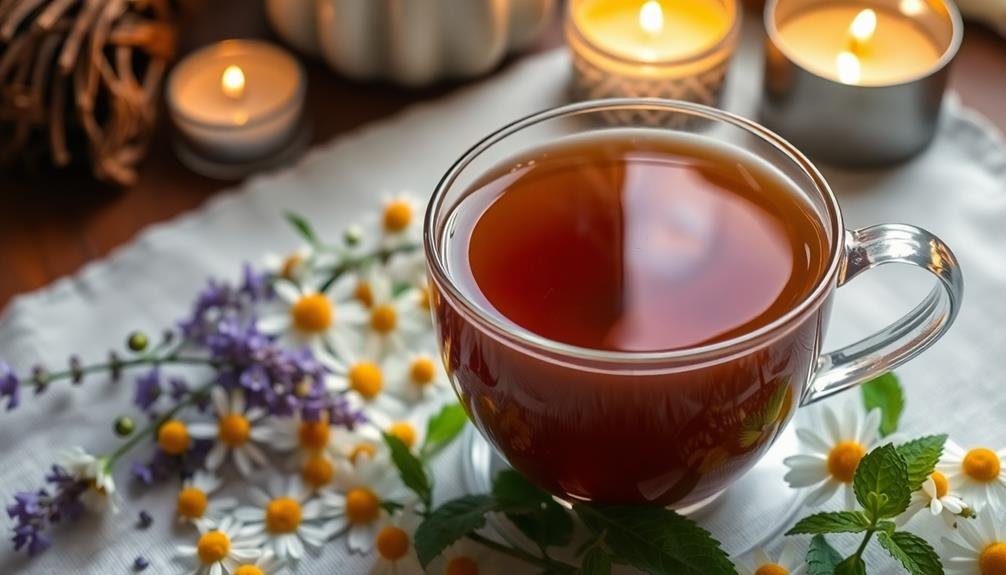
Herbal tea offers a soothing way to unwind and enjoy some health benefits. When you sip on a warm cup, you're not just treating yourself; you're also nourishing your body and mind. Herbal teas are naturally caffeine-free, which means you can enjoy them any time of day without worrying about disrupting your sleep patterns. This makes them a perfect choice for evening relaxation.
You'll find that many herbal teas are rich in antioxidants, which help combat oxidative stress and support overall wellness. Ingredients like chamomile, peppermint, or ginger can aid digestion, reduce inflammation, and promote a feeling of calm. As you savor the flavors, you may notice a decrease in anxiety and stress levels.
Many people find that a warm cup of herbal tea can create a comforting ritual, signaling to the body that it's time to unwind. Additionally, the hydration you get from herbal tea contributes to your overall health. Staying properly hydrated is essential for maintaining energy levels and improving cognitive function.
Key Sleep-Inducing Herbs
Certain herbs have long been cherished for their ability to promote restful sleep. If you're looking to enhance your nightly routine with some natural remedies, consider incorporating these key sleep-inducing herbs into your tea blends.
Valerian root is a popular choice known for its sedative properties. It can help reduce the time it takes to fall asleep and improve overall sleep quality.
You might also want to try passionflower, which is often used to ease anxiety and promote relaxation, making it a fantastic addition to your sleepy-time tea.
Another great option is lemon balm. This herb not only has a pleasant lemony flavor, but it's also been shown to help reduce insomnia and anxiety.
Lavender, with its calming aroma, is another excellent choice. It's been praised for its ability to soothe the mind and promote a peaceful night's rest.
Lastly, consider using ashwagandha. This adaptogenic herb helps combat stress and can enhance sleep quality.
Chamomile: The Classic Choice
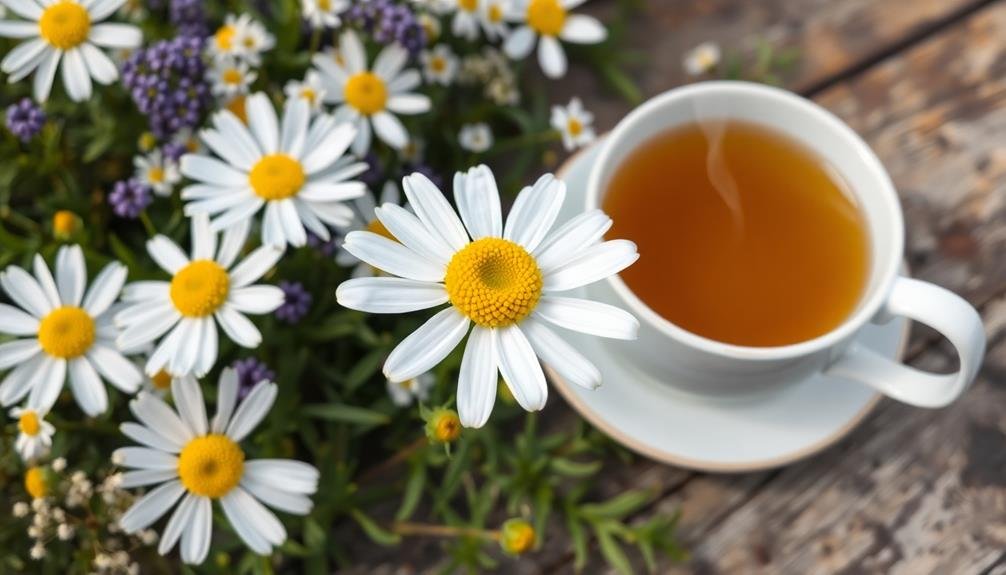
When it comes to winding down, chamomile's your go-to herb for relaxation.
Not only does it offer impressive health benefits, but brewing the perfect cup can elevate your evening routine.
Let's explore how chamomile can help you sleep better and how to make it just right.
Health Benefits of Chamomile
For centuries, chamomile has been celebrated as a soothing remedy for various ailments, particularly in promoting relaxation and better sleep. This delightful herb isn't just a bedtime companion; it offers several health benefits that can enhance your overall well-being.
One of the key benefits of chamomile is its ability to reduce anxiety and stress. When you sip on chamomile tea, you may feel a wave of calm wash over you. Additionally, chamomile can aid digestion, helping to relieve bloating and discomfort after meals. It's also known for its anti-inflammatory properties, which can soothe minor aches and pains.
Here's a quick overview of chamomile's health benefits:
| Benefit | How It Helps | Best Time to Use |
|---|---|---|
| Reduces Anxiety | Promotes relaxation and calmness | Before bed or stressful situations |
| Aids Digestion | Relieves bloating and discomfort | After meals |
| Anti-Inflammatory | Soothes minor aches and pains | Anytime you need relief |
Incorporating chamomile into your routine can be a simple yet effective way to support your health and enhance your sleep quality.
Brewing Perfect Chamomile Tea
Brewing the perfect cup of chamomile tea is an art that can elevate your relaxation experience. Start with high-quality dried chamomile flowers, as their aroma and flavor are key to a soothing brew. Measure about one tablespoon of flowers per cup of water for the best results.
Next, bring fresh, filtered water to a boil. Remove it from the heat just as it starts bubbling; you want it around 200°F (93°C) to avoid scalding the flowers. Pour the hot water over the chamomile in your teapot or cup. Cover it with a lid or a small plate to trap the steam and essential oils.
Steep for about 5 to 10 minutes, depending on how strong you like your tea. Feel free to customize your brew! A touch of honey, lemon, or a sprinkle of cinnamon can enhance the flavor.
Once steeped, strain the flowers and enjoy your calming cup of chamomile. Sip slowly and let the warmth wash over you, creating a peaceful atmosphere that prepares you for a restful night's sleep.
Lavender for Relaxation
When you're looking to unwind, lavender's calming aroma can work wonders for relaxation.
Its sleep-inducing properties help soothe your mind, making it a perfect addition to your bedtime routine.
Plus, blending lavender with other herbs can enhance its effects, offering a customized experience just for you.
Calming Aromatherapy Benefits
Lavender's soothing aroma envelops you in a sense of calm, making it a powerful ally in the quest for relaxation. When you breathe in its fragrant essence, you might notice an immediate shift in your mood.
Lavender isn't just a pretty flower; it's packed with calming aromatherapy benefits that can help you unwind after a long day.
Here are a few ways lavender can enhance your relaxation routine:
- Reduces Anxiety: Inhaling lavender can lower stress levels, promoting a tranquil state of mind.
- Improves Sleep Quality: The calming effects of lavender can create an ideal environment for restful sleep.
- Enhances Mood: Its uplifting scent can elevate your spirits, helping you feel more balanced and at ease.
Incorporating lavender into your daily routine can be as simple as diffusing essential oil, using a lavender-scented candle, or adding dried lavender to your pillow.
No matter how you choose to enjoy it, lavender's calming properties can help you cultivate a peaceful atmosphere, making it easier to relax and recharge.
Sleep-Inducing Properties
Embracing lavender can be a powerful tool for enhancing sleep quality. This fragrant herb isn't just a pretty addition to your garden; it's renowned for its sleep-inducing properties.
When you inhale the soothing scent of lavender, your body often responds by reducing anxiety and promoting a sense of calm. You might find that simply placing a sachet of dried lavender under your pillow helps you drift off into a more restful slumber.
Studies suggest that lavender can lower heart rate and blood pressure, making it easier for you to relax after a long day. If you've ever felt stressed or restless at bedtime, incorporating lavender into your nighttime routine can be a game changer.
You can steep lavender flowers in hot water to make a delicious sleepy-time tea, or you could use lavender essential oil in a diffuser to create a calming atmosphere.
Blending With Other Herbs
Combining lavender with other calming herbs can elevate your relaxation experience considerably. Lavender's soothing aroma and properties make it a perfect base for a sleep-inducing herbal tea. When blended with the right herbs, your bedtime routine can transform into a peaceful ritual that promotes deeper sleep.
Consider these complementary herbs to mix with lavender:
- Chamomile: Known for its mild sedative effects, chamomile can enhance relaxation and help you unwind after a long day.
- Lemon Balm: This herb not only adds a revitalizing flavor but also reduces anxiety and improves sleep quality.
- Valerian Root: Valerian is famous for its sleep-promoting qualities and works wonders alongside lavender to calm your mind.
To create the perfect sleepy-time tea, try combining equal parts of these herbs with dried lavender. Steep the blend in hot water for about 5-10 minutes, allowing the flavors and benefits to meld together.
You'll find that this delightful combination not only tastes great but also helps ease your mind and body, paving the way for a restful night's sleep. Enjoy your relaxation journey!
Valerian Root's Effects
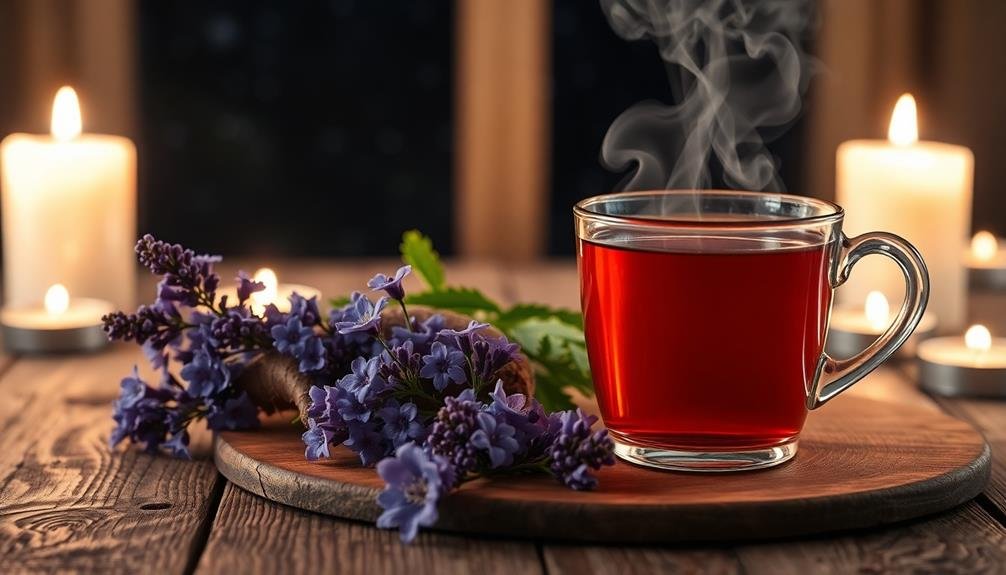
Valerian root has long been celebrated for its calming effects on the mind and body. If you're struggling with sleepless nights or anxious thoughts, this powerful herb might be your answer. When you sip on valerian root tea, you're indulging in a brew that helps ease tension and promote relaxation.
Research suggests that valerian root can enhance sleep quality by increasing the levels of gamma-aminobutyric acid (GABA) in your brain, a neurotransmitter that helps calm the nervous system. You may find yourself drifting off more easily and waking up feeling more refreshed. It's particularly beneficial for those who've trouble falling asleep or staying asleep throughout the night.
In addition to its sleep-inducing properties, valerian root can also help reduce stress and anxiety. By incorporating it into your nightly routine, you're not just preparing for rest but also creating a soothing ritual that signals your body to unwind.
Just remember, as with any herbal remedy, it's wise to consult with a healthcare professional, especially if you're taking other medications. Embrace the calming powers of valerian root and enjoy a more restful night's sleep.
Passionflower for Calmness
If you're looking for a natural way to unwind, passionflower might be just what you need.
Known for its calming properties, this herb can help reduce anxiety and promote better sleep.
Let's explore the benefits of passionflower and some easy brewing techniques to enjoy its soothing effects.
Benefits of Passionflower
Passionflower has long been celebrated for its calming properties, making it a popular choice for those seeking relief from anxiety and stress. When you sip on a warm cup of passionflower tea, you're not just enjoying a soothing beverage; you're also tapping into a range of benefits that can help you relax and unwind.
Here are some key benefits of passionflower:
- Reduces Anxiety: Passionflower can help lower anxiety levels, making it easier for you to navigate stressful situations.
- Improves Sleep Quality: It promotes better sleep by calming the nervous system, allowing you to drift off more easily and enjoy deeper rest.
- Supports Overall Mood: Consuming passionflower can enhance your mood, offering a gentle lift during tough times.
Adding passionflower to your sleepy-time tea blend is a great way to harness its calming effects.
Whether you're dealing with a hectic day or just need a moment of peace, passionflower can be your go-to herbal ally.
Brewing Techniques Explained
To brew the perfect cup of passionflower tea, you'll want to follow a few simple techniques that maximize its calming effects. Start by choosing high-quality dried passionflower. Look for vibrant color and a fresh aroma, as this enhances both flavor and potency. Measure about 1 to 2 teaspoons of dried herb per cup of water.
Next, bring your water to a boil, then let it cool slightly. Passionflower thrives in water that's just below boiling, around 190°F (88°C). Pour the hot water over the dried herb in a teapot or infuser. Cover it to trap the steam and essential oils, letting it steep for 10 to 15 minutes.
Once steeped, strain the tea into your favorite mug. If desired, you can sweeten it with honey or add a splash of lemon for extra flavor.
Drink your passionflower tea about 30 minutes before bedtime to fully enjoy its calming benefits. Remember, consistency is key, so consider making this a nightly ritual to help promote relaxation and improve your sleep quality.
Enjoy the soothing experience as you drift into a peaceful slumber!
Lemon Balm's Soothing Properties
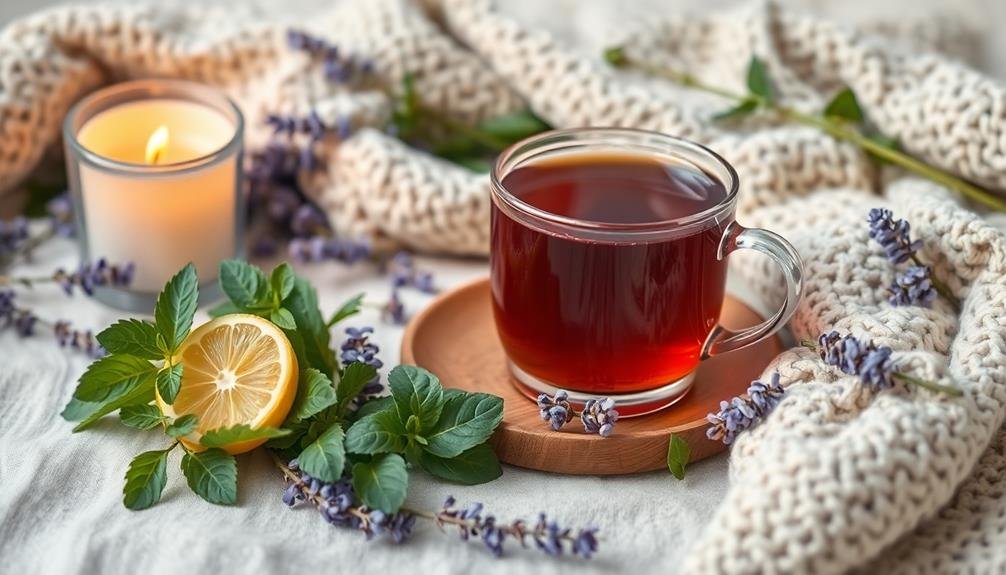
Many people turn to lemon balm for its soothing properties, especially when stress and anxiety take over. This delightful herb, with its fresh lemon scent, has been used for centuries to promote relaxation and calmness.
When you brew a cup of lemon balm tea, you're not just enjoying a tasty beverage; you're also tapping into a natural remedy for unwinding after a long day.
Consider the benefits of lemon balm:
- Reduces Anxiety: It helps lower feelings of tension and promotes a sense of peace.
- Enhances Sleep Quality: Many find that it aids in falling asleep faster and experiencing deeper rest.
- Supports Digestive Health: It can soothe upset stomachs and improve overall digestion, which can also contribute to better sleep.
Incorporating lemon balm into your sleepy-time tea blend can create a comforting ritual that prepares your mind and body for rest.
Whether you're facing a hectic day or winding down from one, this herb offers a gentle way to ease your worries.
Blending Ratios Explained
Understanding blending ratios is essential for crafting the perfect sleepy-time tea. When you're mixing herbs, the ratios can greatly affect the flavor, aroma, and effectiveness of your brew. A common starting point is a 1:1 ratio, where equal parts of each herb create a balanced blend.
For example, if you're using chamomile and lemon balm, you'd combine one teaspoon of each. This approach allows you to appreciate the unique qualities of both herbs.
If you want one herb to shine, use a 2:1 ratio. For instance, if you prefer a stronger chamomile flavor, you could use two teaspoons of chamomile and one teaspoon of lemon balm. On the other hand, if you're looking for a more subtle blend, consider a 1:2 ratio, where the secondary herb complements the primary one.
Don't hesitate to experiment! Everyone's palate is different, and personal preference plays a huge role in creating your ideal sleepy-time tea.
Keep notes on your ratios and flavors, so you can replicate your favorite blends or tweak them further as needed. Happy blending!
Techniques for Brewing Tea
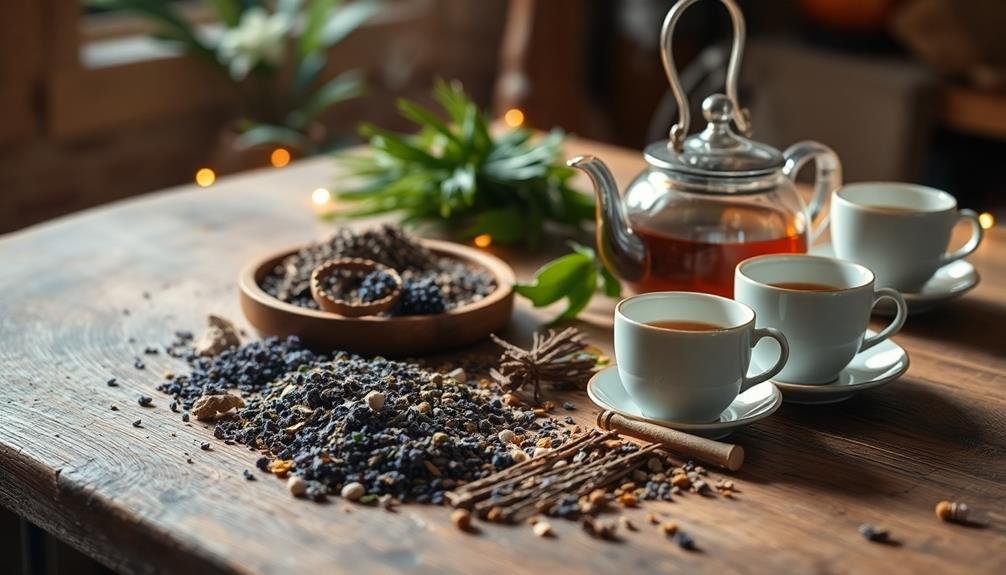
Brewing the perfect sleepy-time tea requires attention to detail and a few simple techniques. Start with quality ingredients; fresh herbs and loose leaves can make a big difference.
Here are some key techniques to enhance your brewing experience:
- Water Temperature: Use water that's just below boiling, ideally around 200°F (93°C), to extract the flavors without scalding the herbs.
- Steeping Time: Steep your tea for 5 to 7 minutes. This allows the herbal properties to infuse fully, promoting relaxation and sleepiness.
- Teapot or Infuser: Use a teapot or a fine mesh infuser for loose leaf tea. This guarantees even extraction and makes it easy to remove the herbs when your tea is ready.
After brewing, remember to taste before adding any sweeteners or milk. Each herb has its unique flavor profile, and you might find that your blend needs no enhancements.
Finally, pour your tea into your favorite mug, and enjoy the calming aroma as you sip. These techniques will aid you in creating a soothing cup that prepares you for a restful night.
Happy brewing!
Customizing Your Sleep Blend
As you wind down in the evening, customizing your sleep blend can make a significant difference in your relaxation routine.
Start by selecting your base herbs. Chamomile and valerian root are popular choices, known for their calming effects. You might also consider adding passionflower for its soothing properties or lavender for a pleasant aroma.
Next, think about flavors. If you prefer a sweeter taste, try adding a bit of honey or a touch of licorice root. Mint can add a revitalizing twist, while cinnamon can provide warmth and comfort. Experimenting with different combinations helps you discover what truly resonates with your senses.
Don't forget about balance. Aim for a mix of herbs that relax the mind and body, but also consider your unique preferences. You might want to focus on stress relief one night and deeper sleep another.
Lastly, keep notes on your blends. This way, you'll remember what worked best for you and can refine your recipes over time.
Customizing your sleep blend not only enhances your tea experience but also promotes a more restful night's sleep tailored just for you.
Storing and Preserving Herbs
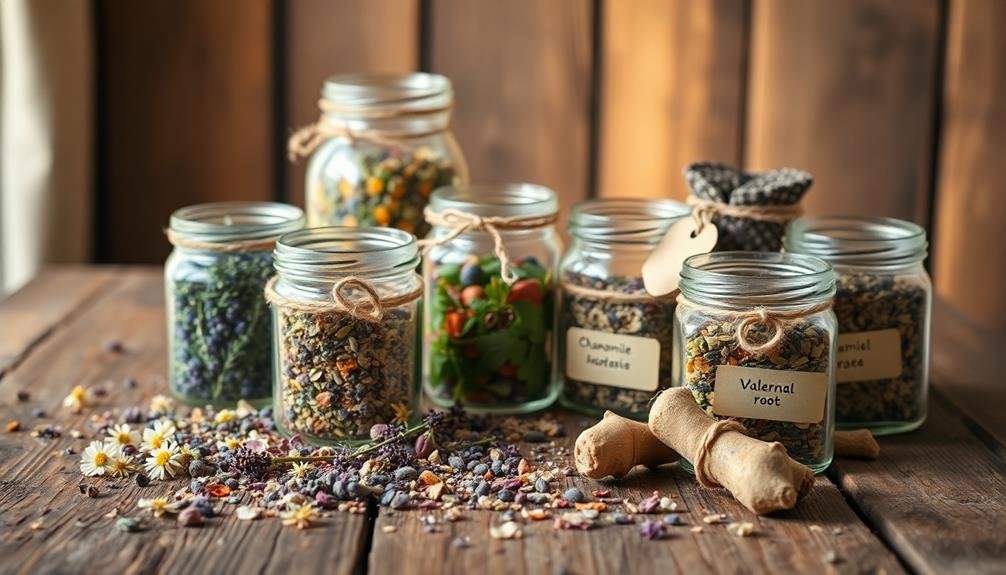
After you've crafted your perfect sleep blend, it's important to think about how to store and preserve your herbs to maintain their potency and flavor.
Proper storage guarantees that your herbs stay aromatic and effective for your nightly tea rituals.
Here are three key tips for storing your herbs:
- Keep it Cool: Store your herbs in a cool, dark place. Heat and sunlight can degrade their quality.
- Use Airtight Containers: Opt for glass jars or airtight containers to keep moisture and air out, which can lead to spoilage.
- Label Your Blends: Always label your containers with the date and contents. This helps you keep track of freshness and guarantees you'll know exactly what you're using.
Frequently Asked Questions
Can I Drink Sleepy-Time Tea Every Night?
Yes, you can drink sleepy-time tea every night. It's generally safe for most people, but if you have concerns or experience side effects, it's best to consult your healthcare provider for personalized advice.
Are There Any Side Effects From Herbal Sleep Teas?
Yes, there can be side effects from herbal sleep teas. You might experience drowsiness, digestive issues, or allergic reactions. It's best to consult a healthcare professional if you're concerned about how these herbs affect you.
How Long Before Bed Should I Drink the Tea?
You should drink the tea about 30 to 60 minutes before bed. This timing allows the herbs to work their magic, helping you relax and prepare for a restful night's sleep without feeling rushed.
What if I'm Allergic to Certain Herbs?
If you're allergic to certain herbs, you should avoid them to prevent reactions. Always check ingredients before trying new teas. Consider consulting a healthcare professional for safe alternatives that promote relaxation without triggering allergies.
Can Children Drink Sleepy-Time Tea Blends?
When considering sleepy-time tea for children, it's crucial to consult a pediatrician first. Some herbs may not be suitable for kids, so always guarantee safety and proper dosage before introducing any herbal remedies.
In Summary
Incorporating sleep-inducing herbs into your tea blends can transform your nighttime routine. Whether you stick with traditional chamomile or experiment with lavender and valerian root, finding the right mix can promote relaxation and better sleep. Remember to customize your blend to suit your taste and needs, and don't forget proper storage to keep your herbs fresh. With the right techniques, you'll enjoy soothing, restorative brews that help you drift off peacefully every night.



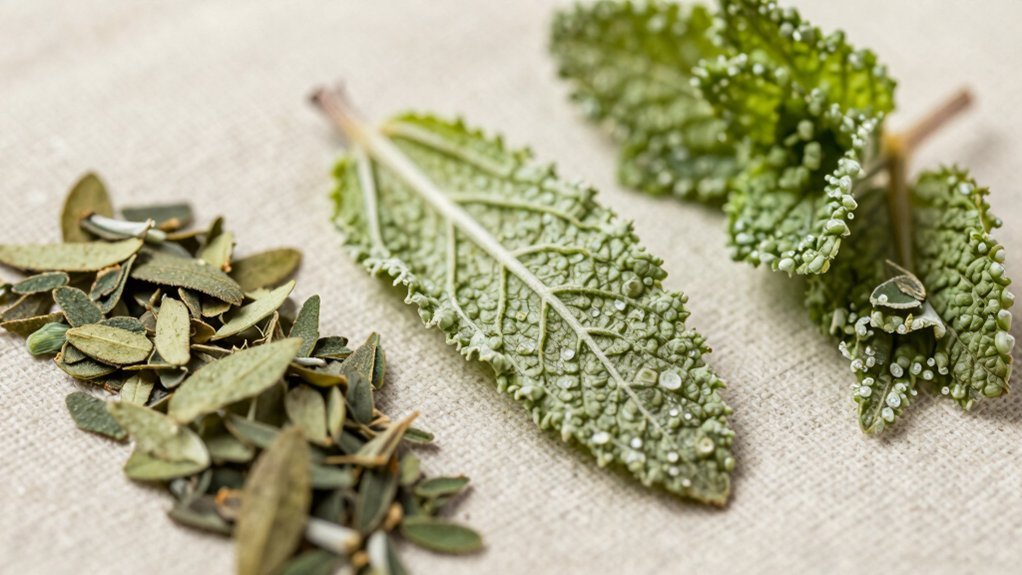

Leave a Reply